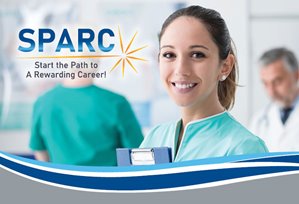Even before the COVID-19 pandemic began at the tail end of 2019, the US healthcare system was already facing a serious problem—a critical shortage of nursing staff. Initially, the shortage was driven by two factors: more Americans were reaching retirement an age where they demanded more healthcare services, and at the same time, more nurses were reaching retirement age as well.
Exacerbating the current nursing shortage is an additional shortage—that of nurse educators. "This aspect of the nursing shortage is often overlooked," says Brian Stephens, CEO of Door County Medical Center. "But it seems obvious," he continues, "that in order to train more bedside nurses—to address the overall shortage of nurses—you need more nurse educators in general." Indeed, a recent study by the American Association of Colleges of Nursing found that in the 2020/2021 academic year, despite a surge in applications, "U.S. nursing schools turned away 80,521 qualified applications from baccalaureate and graduate nursing programs," due, in part, to an insufficient number of faculty.
SPARC—Start the Path to a Rewarding Career
Statistics and studies from academic institutions can make issues like the nationwide nursing shortage seem far away—as if these shortages are only really affecting major cities, or university hospitals. However, the fact remains that the nursing shortage is truly nationwide, and affecting the community right here in Door County. "Even here at Door County Medical Center," remarks Stephens, "we have a shortage of nurses at nearly every level."
 In order to tackle this issue and eliminate barriers head on, Door County Medical Center (DCMC) has created SPARC—or, Start the Path to a Rewarding Career—an on-the-job healthcare training program designed to assist future Certfied Nursing Assistants (CNAs), Certified Medical Assistants (CMAs), Licensed Practical Nurses (LPNs) and Registered Nurses (RNs) receive the education they need by providing both the financial support and on-the-job hours needed to complete licensure and certification.
In order to tackle this issue and eliminate barriers head on, Door County Medical Center (DCMC) has created SPARC—or, Start the Path to a Rewarding Career—an on-the-job healthcare training program designed to assist future Certfied Nursing Assistants (CNAs), Certified Medical Assistants (CMAs), Licensed Practical Nurses (LPNs) and Registered Nurses (RNs) receive the education they need by providing both the financial support and on-the-job hours needed to complete licensure and certification.
How does SPARC work?
For the CMA, LPN and RN portions of the program, SPARC is a collaboration between DCMC and the Northeast Wisconsin Technical College (NWTC) and is composed of an academic portion and a clinical portion.
NWTC teaches the academic portion, and in order to make every student's education more attainable, DCMC fronts the cost of tuition. "DCMC and NWTC are currently working together on a plan that allows DCMC participants to complete the academic portion either online or virtually," says Renee Glesner, RN, MSN and Education Coordinator of the SPARC program. "Although," she adds, "there will be 2 to 3 classes that will need to be attended in person at the NWTC campus in Green Bay, as the Sturgeon Bay campus does not offer those classes."
 DCMC is responsible for the clinical portion, providing each student with the clinical hours needed to complete certification or licensure for a career as a CNA, CMA, LPN or RN. "These clinical sessions are taught by DCMC nursing staff and completed on site, during paid working hours at the hospital," Glesner explains, "This means, not only is tuition covered, but program participants are paid during clinical hours, allowing them to support themselves financially as they progress through their course work."
DCMC is responsible for the clinical portion, providing each student with the clinical hours needed to complete certification or licensure for a career as a CNA, CMA, LPN or RN. "These clinical sessions are taught by DCMC nursing staff and completed on site, during paid working hours at the hospital," Glesner explains, "This means, not only is tuition covered, but program participants are paid during clinical hours, allowing them to support themselves financially as they progress through their course work."
As Education Coordinator, Glesner works directly with NWTC to ensure that the clinical and academic portions align so participants get exposure to several areas throughout the organization. When the SPARC participant's program is completed, they'll have the education, training and clinical hours needed to take their certification or licensure exam.
The CNA portion of SPARC is not run in conjunction with NWTC. Rather, all training takes place at the hospital as DCMC is a Wisconsin Department of Health Services (DHS) approved training site for CNAs.
"When I started the program," says Bryanna Adcock, who recently received her CNA certification through SPARC, "I had no previous nursing experience and I found the length of the program to be a strong foundation for my growth and training. I think what makes it so beneficial," she explains, "is that, as students, we were encouraged to be hands-on with patients, while also being guided by mentors during the process." She continues, "Not only did this approach allow us to apply what we had learned through our training, but it also allowed us to develop our skills and hone our instincts."
Who is SPARC for and what are the requirements?
 "SPARC is available to anyone who wants to be a DCMC employee, meets the requirements and is offered a position after the interview process," says Glesner, adding, "Simultaneously, the individual must also be accepted into the SPARC program."
"SPARC is available to anyone who wants to be a DCMC employee, meets the requirements and is offered a position after the interview process," says Glesner, adding, "Simultaneously, the individual must also be accepted into the SPARC program."
While specific requirements vary from program to program, the basic requirements are the same across the board—namely, participants are required to:
-
Come in with a minimum of a CNA, or are required to take the Wisconsin DHS-approved DCMC Nursing Assistant Program to be eligible.
-
Meet the NWTC academic requirements if pursuing a degree in CMA, LPN or RN Programs.
-
Sign a commitment agreeing to maintain your employment at DCMC for a minimum of 3 years.
How do I apply to the SPARC program?
For more information visit: https://www.dcmedical.org/sparc, or call (920) 746-3563 to speak to Education Coordinator Renee Glesner.
•
"While the healthcare industry has been losing nurses in recent years due to issues like burnout and retirement," Stephens explains, "there is also no shortage of people that want to become healthcare professionals." He continues, "What ends up happening is that people don't have the time or the financial means to take those first important steps toward a healthcare career." "Often," Glesner adds, "people are juggling a full-time job and responsibilities at home and in their personal lives. What we're trying to do at DCMC is reduce or eliminate those barriers—we're trying to relieve some of that financial burden—make a healthcare career as attainable as possible."
Brian Krogh, Associate Dean, Health Sciences at NWTC adds, "NWTC recognizes the crucial nursing shortage and the need for highly trained healthcare workers. We are excited to partner with organizations like DCMC to provide flexible and accessible pathways to these sought-after careers."
"My experience through this whole process has been rewarding to say the least," remarks Adcock. "From the very beginning of the program, I met wonderful patients, residents and coworkers. You end up feeling like you're part of a team—of being a part of something bigger than yourself, and of being respected and valued because an organization is investing both in you, and in the future of the hospital. That feeling makes coming to work everyday very easy."
"I wholeheartedly recommend the SPARC program to anyone interested in a career in healthcare," Adcock continues, "It's an amazing opportunity, in that you are able to study a particular field without added financial stress," she explains, adding, "Being a mom of three and needing a second income in today's economy makes it very hard to pursue schooling opportunities—to further my education—without the promise of landing a job. This program made it accessible—and for that, I couldn't be more grateful."